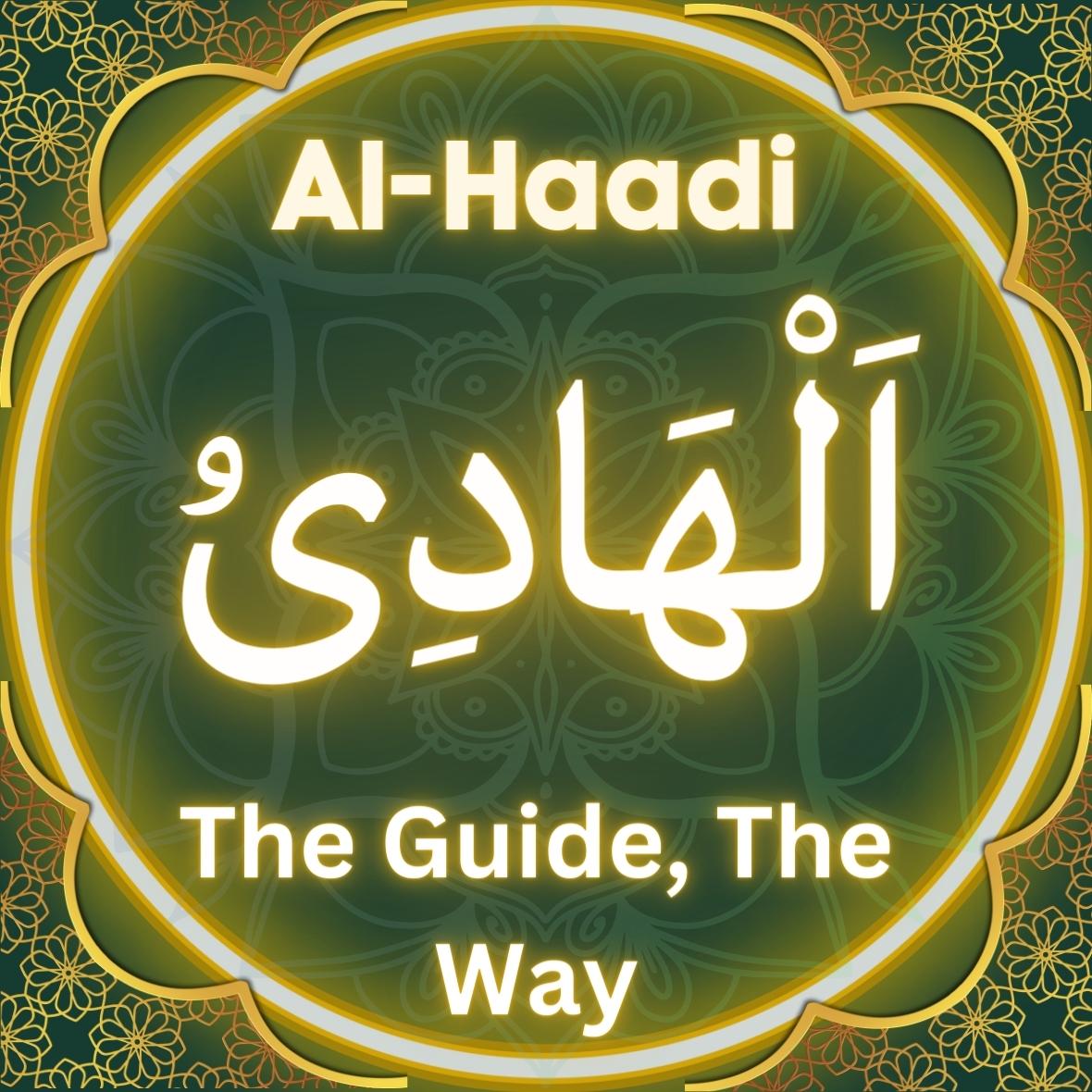Al-Haadi (ٱلْهَادِي) – The Guide, The Way
Explanation
Introduction
Among the greatest treasures in Islam is the knowledge of Asma’ul Husna (The Beautiful Names of ALLAH). These Divine Names are not mere titles; they embody profound meanings that help believers recognize the perfection, mercy, and majesty of their Creator. By learning and reflecting upon the 99 Names of ALLAH, Muslims draw closer to Him in love, fear, and hope. Each Name opens a door to deeper spiritual understanding, guiding the heart towards the eternal truth.
One of these profound Names is Al-Haadi (ٱلْهَادِي) — The Guide, The One Who Directs to the Right Way. In an age of confusion, distractions, and uncertainty, understanding this Divine Attribute is a source of immense comfort and direction. It reminds the believer that guidance is not merely a result of human intellect or effort but a divine gift from ALLAH, the One who guides hearts towards light, faith, and righteousness.
This article explores the meaning, linguistic background, theological significance, and practical applications of the Name Al-Haadi, while integrating classical tafsir, Qur’anic references, and modern insights for personal and communal development.
The Meaning of Al-Haadi
The Name Al-Haadi (ٱلْهَادِي) comes from the Arabic root ه د ي (H-D-Y), which carries the meaning of guidance, direction, showing the way.
-
Literal meaning: The One who guides, the One who leads to the straight path.
-
Metaphorical meaning: The One who inspires hearts, enlightens minds, and directs people toward truth, righteousness, and eternal salvation.
ALLAH as Al-Haadi is the ultimate source of hidayah (guidance). No prophet, scholar, or teacher can guide except by ALLAH’s permission.
Linguistic and Theological Analysis
-
Root Letters (ه د ي): Indicate movement towards the right path with clarity. In Arabic, hady refers to guidance that leads to safety, purpose, and destination.
-
Qur’anic Usage: The concept of guidance (huda) appears over 300 times in the Qur’an, signifying its central role in faith.
-
Grammatical Form: “Al-Haadi” is in the fa‘il (active participle) form, meaning “The One Who Continuously Guides.”
Classical Tafsir Insights:
-
Ibn Kathir: ALLAH guides whom He wills to truth through signs, messengers, and inner illumination of the heart.
-
Imam al-Ghazali: Guidance has two levels: (1) showing the path, and (2) enabling one to walk upon it — the second belongs only to ALLAH.
-
Ash‘ari Scholars: Guidance is both irshad (showing the way) and tawfiq (granting success).
Significance in Islamic Thought
The Name Al-Haadi forms the foundation of aqeedah (belief):
-
True guidance is solely from ALLAH.
-
Prophets are means of guidance, but ALLAH alone grants acceptance.
-
It reminds believers of tawheed (Oneness), as no one can force faith into the heart except ALLAH.
Scholars across Sunni traditions emphasize that Al-Haadi protects from misguidance, arrogance, and reliance solely on intellect without divine light.
Spiritual and Practical Lessons from Al-Haadi
-
Reliance on ALLAH for Guidance: True direction in life comes from Him, not just human wisdom.
-
Humility in Seeking Knowledge: We cannot find truth without His light.
-
Hope in Times of Confusion: ALLAH guides the sincere seeker to clarity.
-
Gratitude for Iman (faith): Belief itself is a gift of guidance.
-
Encouragement for Dawah: We invite others, but only ALLAH opens hearts.
Practical Implementation for Al-Haadi
Muslims can connect with Al-Haadi through:
-
Dhikr: Repeating “Ya Haadi” in supplication, asking for clarity in decisions.
-
Qur’an Reflection: Reading the Qur’an as the ultimate guide.
-
Dua in Uncertainty: Praying, “O ALLAH, guide me among those You have guided.”
-
Following Sunnah: Living by the example of Prophet Muhammad ﷺ.
-
Helping Others Find Guidance: Sharing knowledge while knowing results belong to ALLAH.
Direct Quran References
The specific Name Al-Haadi is mentioned indirectly but clearly in verses highlighting ALLAH as the ultimate guide.
Surah Al-Furqan (25:31)
Arabic: وَكَفَىٰ بِرَبِّكَ هَادِيًا وَنَصِيرًا
Translation: “But sufficient is your Lord as a Guide and a Helper.”
Tafsir (Ibn Kathir): ALLAH alone suffices as a guide for believers amidst trials, protecting them against misguidance.
Related Quranic Verses
Surah Yunus (10:35)
Arabic: أَفَمَن يَهْدِي إِلَى الْحَقِّ أَحَقُّ أَن يُتَّبَعَ
Translation: “Is He who guides to the truth more worthy to be followed?”
Tafsir: This verse emphasizes that no one guides except ALLAH.
Surah Al-Isra (17:97)
Arabic: وَمَن يَهْدِ اللَّهُ فَهُوَ الْمُهْتَدِي
Translation: “And whoever ALLAH guides – he is the [rightly] guided.”
Tafsir: Guidance is divine, not humanly earned alone.
FAQs about Al-Haadi
Q1: Is Al-Haadi mentioned directly as a Name in the Qur’an?
Yes, in Surah Al-Furqan (25:31).
Q2: Can Muslims call upon ALLAH using this Name?
Yes, “Ya Haadi” is a recommended dhikr when seeking clarity or protection from misguidance.
Q3: How is Al-Haadi connected to Dawah?
We deliver the message, but ALLAH guides hearts.
Q4: What is the difference between Hidayah (guidance) and ‘Ilm (knowledge)?
Knowledge is information; Hidayah is divine direction to act upon it.
Q5: Is there a related Name of ALLAH close to Al-Haadi?
Yes, Ar-Rashid (The Righteous Teacher) is closely connected in meaning.



